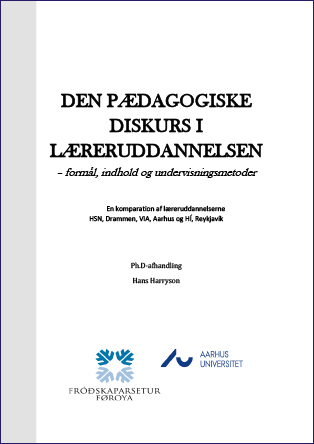Den pædagogiske diskurs i læreruddannelsen - formål, indhold og undervisningsmetoder: En komparation af læreruddannelserne HSN, Drammen, VIA, Aarhus og HÍ, Reykjavík
Nøgleord:
læreruddannelse, de pædagogiske fag, den pædagogiske diskurs, pædagogik, pædagogisk psykologi, didaktikSynopsis
”The pedagogical discourse in teacher education – purpose, content and teaching methods. A comparative study of the teacher education in HSN, Drammen, VIA, Aarhus and HÍ, Reykjavík”
This thesis explores the purpose of pedagogical courses (i.e. pedagogy and related fields) in teacher education degrees in the 2010s and how these courses contribute to develop both teacher competences and teaching competences.
The thesis is a comparative analysis of three Nordic teacher education degrees, namely
- The teacher education degree at HSN, Drammen (NO)
- The teacher education degree at VIA, Aarhus (DK)
- The teacher education degree at HÍ, Reykjavík (IS)
To gain an understanding of the role of the pedagogical courses at the three teacher education degrees, I have employed
- Document analysis
- Semi-structured interviews
The document analysis has covered both governmental documents (e.g. laws and executive orders) and institutional documents (e.g. curricula).
The persons interviewed represent
- Educators of courses in pedagogy
- Final year students
- Graduates
Though using two different research methods, I have employed cross-sectional data indexing. This means I have used the same set of indexing categories for both the document analysis and the interview analysis.
In processing the data, I have used etic coding (or predetermined coding). The categories I have operated with in organising the data are
- Titles and size (in ECTS) of pedagogical courses
- Learning outcomes
- Thematic and theoretical content
- Teaching methods
- Methods of examination
- Practical application
- Positioning – differences between pedagogical courses on one side and teaching subjects on the other
In the thesis, pedagogical courses are seen as a unique discourse in teacher education degrees, in which the teaching profession is expressed in certain ways, and where attempts are made to prepare students in teacher education for their profession in different ways than in teaching subject courses and in practicums.
In analysing the data, I use discourse analytic (DA) reading strategies. The reason for using DA is my interest in how policy makers on different levels, educators, students and graduates understand and articulate the pedagogical discipline’s role and unique challenges in teacher education degrees today.
Among the central findings of my research are:
(1) The pedagogical discourse is a relatively isolated discourse in teacher education.
(2) The pedagogical discourse has expanded over the past decades and covers today areas that previously belonged to the teaching subjects, the academic field, information technology etc.
(3) Although the pedagogical discourse has expanded and has expanded in different directions in the various countries, a marked ‘typicality’ can be traced across national borders. The pedagogical discourse typically discusses cross-disciplinary themes, including
- the purpose and curricula of public schools
- democracy
- learning and teaching theories
- teaching methods and differentiation
- evaluation
- classroom management
- the importance of relationships
- school/home cooperation
- inclusion
- challenges in special education
- teacher cognition broadly understood
(4) The pedagogical disciplines are the most theoretical in teacher education. Consequentially, the theory-practice challenges are at least as great in pedagogical courses as they are in other disciplines in teacher education—if not greater.
(5) Even though modern teacher education programmes work with ‘learning outcomes’ and not ‘teaching input,’ the pedagogical discourse still relies on its own unique theories. These theories are neither derived from the teaching subject or practice field but from the pedagogical field’s traditional source theories – psychology, sociology and philosophy.
(6) In the pedagogical discourse, students read many introductory textbooks written for the teaching profession, teacher education or specific courses in teacher education.
(7) In the pedagogical discourse, students read a limited amount of primary literature and research literature. Public school textbooks are so to say absent in the bibliographies.
(8) In the pedagogical discourse, lectures using PowerPoint is the most used teaching method. There is little to suggest that teaching in pedagogical courses is more exemplary and varied than in other courses.
(9) Both daily teaching and exams set markedly greater focus on knowledge goals than skill and competence goals.
Educators, students and graduates all agree that the pedagogical field is an important part in qualifying one to teach. But they simultaneously point out that in the pedagogical discourse students learn primarily ´to know, think and feel as teachers` and to a far lesser extent ´to act as teachers` i.e. it is the student’s mind set which is the discourse’s primary focus area and not the students’ competence to perform in a future classroom

